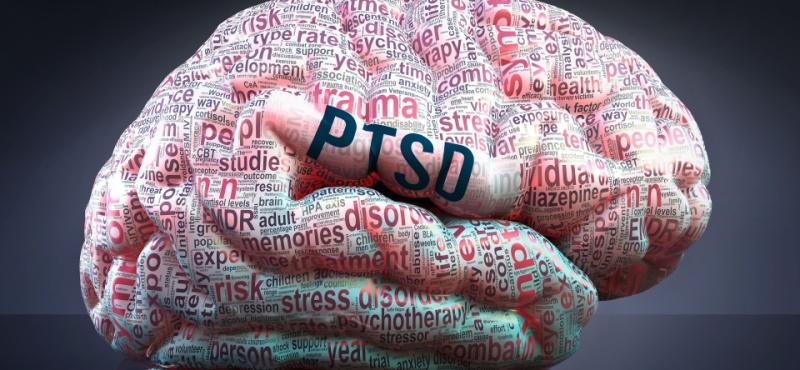For many years, doctors believed that Post Traumatic Stress Disorder randomly affected some people who went through extremely stressful situations. Although the latest science has clearly debunked that idea, many doctors still cling to the old ways.
Extreme stress causes a chemical imbalance in the brain, much like a loud noise, like an explosive blast, causes a traumatic brain injury, or an EMP disables electric devices. A stress wave shrinks the hippocampus (part of the brain that controls logical responses). As a result, the amygdala (emotional responses) expands into the vacant space. This imbalance causes symptoms like anger, depression, and flashbacks.
Not everyone sees the science. A kinesiologist at the University of Maryland has done preliminary, unpublished research that found high school football players who drank chocolate milk after every practice or game did better on some cognitive and motor tests after a concussion. But if a dairy product was really that effective, PTSD would not exist.
Since PTSD is a physical brain injury, a Defense Base Act lawyer can obtain the financial benefits these victims, and their families, need and deserve when a private military contractor is injured overseas. These financial benefits usually include lost wage replacement and medical bill payment.
Normal Stress Response
Depending on the situation, NSR could be a normal, temporary condition that largely goes away on its own, or it could be the straw that broke the camel’s back.
The moderate levels of stress that many contractors experience every day usually cause NSR. These moderately stressful events include:
- Walking through a market and noticing a suspicious person who could be just another shopper or a suicide bomber,
- Seeing a person use a cell phone, possibly to text a friend or possibly to activate a roadside bomb,
- While on patrol, being constantly on the lookout for disturbed patches of ground that could conceal an IED, and
- Learning about attacks at nearby installations and being fearful that the same thing could happen closer to home.
Informal counseling (“talking it out” with a friend or family member) is usually the most effective NSR treatment. Generally, it’s the only necessary one as well. Very few NSR victims need formal therapy sessions with a professional. Even fewer need medication.
However, NSR is also associated with CTE (Chronic Traumatic Encephalopathy). The cumulative effects of small brain injuries, like NSR, could cause this disease which is always degenerative and often fatal.
Acute Stress Disorder
ASD, while not generally associated with CTE, could very well lead to PTSD. Eventually, these small episodes erode the hippocampus to the extent that the person reaches a tipping point.
Examples of ASD-related stress among contractors include a sniper who does not get a shot off, a vehicle breakdown in a dangerous area, or going on patrol with a man down.
Treatment for ASD goes well beyond the “talking it out” treatment for NSR. If left untreated, acute stress disorder often develops into PTSD. Acute stress disorder can be treated through individual and group therapy, medication, and intensive treatments designed by a psychiatrist.
Uncomplicated PTSD
A one-time stressful event, like being caught in a firefight, a motor vehicle collision, or a helicopter crash, triggers uncomplicated PTSD. The U-word means this brain injury is easier to treat, not that the brain injury is any better than the other kinds of PTSD discussed below.
Symptoms of uncomplicated PTSD include avoidance of trauma reminders, nightmares, flashbacks to the event, irritability, mood changes, and changes in relationships. Uncomplicated PTSD can be treated through therapy, medication, or a combination of both.
Complex PTSD
This form of PTSD, which is caused by multiple stressful events, is the most common kind of PTSD among contractors in the field. Multiple stressful events cause complex PTSD.
Frequently, contractors try to “shake off” the aforementioned effects of PTSD. So, instead of getting better, their brain injuries deteriorate. The only treatments for such advanced injuries are powerful drugs and intensive therapy. Powerful drugs have powerful side effects that often interfere with job duties. Intensive, time-consuming therapy usually isn’t an option for contractors in the field.
If a victim’s reluctance to see a doctor contributed to PTSD or any other injury, a DBA lawyer can usually still obtain maximum compensation, as long as the stressful event substantially caused the PTSD.
Complex PTSD also branches out, making it more difficult to treat. For example, individuals with complex PTSD can be diagnosed with borderline or antisocial personality disorder or dissociative disorders. They exhibit behavioral issues, such as impulsivity, aggression, substance abuse, or sexual impulsivity. They can also exhibit extreme emotional issues, such as intense rage, depression, or panic.
Comorbid PTSD
Once they return home, many contractors with PTSD take medical treatment into their own hands. The self-medication approach often works in the short term, which is why so many people develop comorbid PTSD. In the long term, however, this approach is destructive.
Comorbid PTSD is a blanket term for co-occurring disorders. It is applied when a person has more than one mental health concern, often coupled with substance abuse issues. Comorbid PTSD is extremely common, as many people suffer from more than one condition at a time. Best results are achieved when both the commingling mental health condition and the comorbid PTSD are treated at the same time.
Many people who suffer from any of the five types of PTSD try to treat it on their own. This can include self-medication and other destructive behaviors. Using drugs or alcohol as a way to numb the pain will only make things worse and prolong treatment. It is critical for your own mental health to gain an understanding of which type of PTSD you believe you are feeling and make a decision to get the guidance needed for healing.
For more information about DBA benefits, contact Barnett, Lerner, Karsen, Frankel & Castro, P.A.

